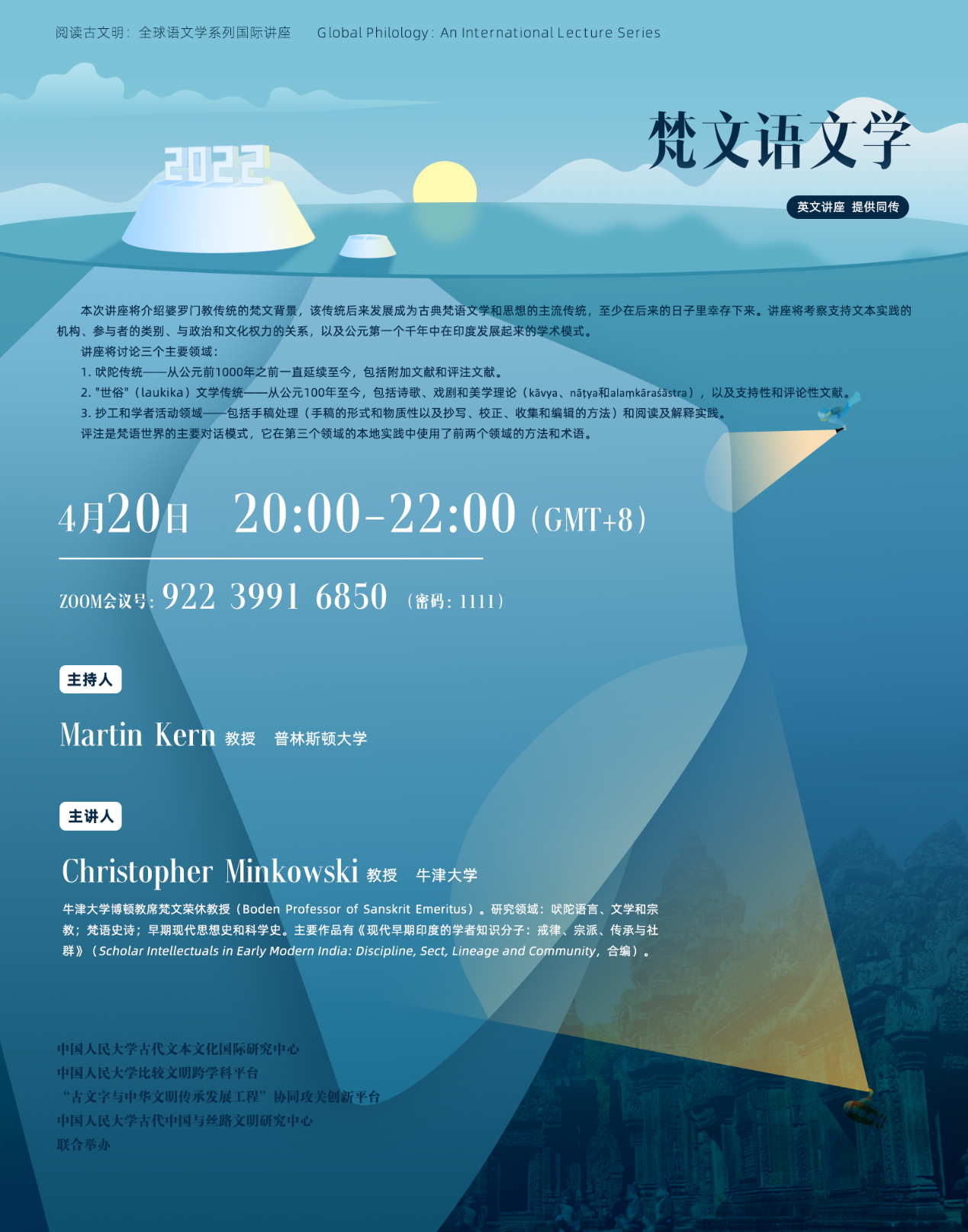【预告】梵文语文学
发布时间:2022-04-18阅读古文明:全球语文学系列国际讲座
(第八讲)
Global Philology: An International Lecture Series
梵文语文学
Sanskrit Philology

题目:梵文语文学 (Sanskrit Philology)
主讲人:Christopher Minkowski教授,牛津大学
主持人:Martin Kern教授,普林斯顿大学
时间:2022年4月20日20:00-22:00(GMT+8)
Zoom会议号:922 3991 6850
密码:1111
Zoom链接:https://zoom.us/j/92239916850?pwd=MnhBaGxZY1ZpQ3BGMWovRHR1U0h2QT09
主讲人简介:
Christopher Minkowski教授,牛津大学博顿教席梵文荣休教授(Boden Professor of Sanskrit Emeritus)。研究领域:吠陀语言、文学和宗教; 梵语史诗; 早期现代思想史和科学史。主要作品有《现代早期印度的学者知识分子:戒律、宗派、传承与社群》(Scholar Intellectuals in Early Modern India: Discipline, Sect, Lineage and Community,合编)。
讲座简介:
本次讲座将介绍婆罗门教传统的梵文背景,该传统后来发展成为古典梵语文学和思想的主流传统,至少在后来的日子里幸存下来。讲座将考察支持文本实践的机构、参与者的类别、与政治和文化权力的关系,以及公元第一个千年中在印度发展起来的学术模式。
讲座将讨论三个主要领域: 1. 吠陀传统——从公元前1000年之前一直延续至今,包括附加文献和评注文献。2. "世俗"(laukika)文学传统——从公元100年至今,包括诗歌、戏剧和美学理论(kāvya、nāṭya和alaṃkāraśāstra),以及支持性和评论性文献。3. 抄工和学者活动领域——包括手稿处理(手稿的形式和物质性以及抄写、校正、收集和编辑的方法)和阅读及解释实践。评注是梵语世界的主要对话模式,它在第三个领域的本地实践中使用了前两个领域的方法和术语。
本讲配有中英文同声传译,欢迎大家参与!
附:讲座英文简介
The lecture will lay out the background for the Sanskrit of the Brahminical tradition, which developed into the mainstream tradition of classical Sanskrit literature and thought, at least as it has survived into later days. It will consider the institutions that supported textual practices, the kinds of actors involved, the relations to political and cultural power, and the modes of scholarship that developed in India over the first millennium of the common era.
The three main fields of activity that will be considered are: 1. The Vedic tradition, which stretches continuously from before 1000 B.C.E. to the present, and includes ancillary and commentarial literature. 2. The ‘worldly’ (laukika) literary tradition, which stretches from ca. 100 C.E. to the present, and comprises poetry, drama, and aesthetic theory (kāvya, nāṭya, and alaṃkāraśāstra), as well as supporting and commentarial literature. 3. The field of scribal and scholastic activity, which comprises on the one hand the treatment of manuscripts: their form and materiality as well as methods of copying, correcting, collecting, and editing, and on the other hand practices of reading and interpreting. Commentary was a primary discursive mode in the Sanskrit cosmopolitan space, which enacted the methods and terms of art of the first two fields through the local procedures of the third.